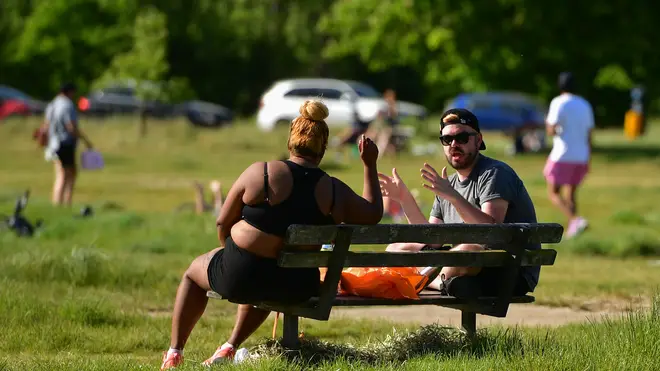
Nick Ferrari 7am - 10am
29 May 2020, 07:52

One in seven people could have broken coronavirus lockdown rules by having visits from friends or family, according to new research.
A study into coronavirus lockdown restrictions found that members of the public claimed to be abiding by the "stay at home" advice to an "extraordinary degree".
King's College London (KCL) along with polling firm Ipsos Mori said 14 per cent of those questioned said they have had home visits from friends or relatives during the lockdown - compared with just five per cent at the start of April.
The poll was undertaken after the Government relaxed its "stay at home" guidance, instead adopting the slogan "stay alert" on May 10.
And it closed on the day news first broke of political aide Dominic Cummings' alleged lockdown breach after he travelled 260 miles to County Durham in March to self-isolate with his family.
Read more: New coronavirus lockdown rules: What changes have been made to Covid-19 restrictions?
Listen & subscribe: Global Player | Apple Podcasts | Google Podcasts | Spotify
Researchers interviewed 2,254 people aged between 16 and 75 from May 20-22, and compared some of the findings with a previous survey from April 1-3.

Large group playing cricket during coronavirus lockdown run away from police
On Thursday, Prime Minister Boris Johnson announced that groups of up to six would be able to congregate in private gardens from Monday if they stay two metres apart, but they cannot stay overnight or go indoors other than to access a garden.
Professor Bobby Duffy, director of the Policy Institute at KCL, said the study showed a reasonable proportion of those surveyed have had visits from family and friends while this was not permitted.
He said: "Out of all the compliance things that's the one that stands out...
"And it points to some of our motivations in this: that missing family and friends and not being able to see them is a big, clear, difficult thing for people to cope with, and it's strange to people that we can do all sorts of other things like go to work now but they can't have friends and family in their home."
He added: "Not a lot has been said on it yet about what is the route to this, and leaving that gap does increasingly mean people will be taking their own decisions on it, so, yes, that's a risk for control of the virus but it's also a risk for credibility and trust in the government approach, where people will increasingly see it as a disconnect from all the other things people are allowed to do."

Mother's concerns over her children returning to school following lockdown
Despite the rise, Prof Duffy said the figure still demonstrated "incredible compliance when you think about how many families are separated".
Another change since the beginning of April is that more than a third (38 per cent) of respondents said they are wearing face masks, double the 19 per cent who were wearing them six weeks ago.

Michael Gove calls 5G coronavirus conspiracy theories ‘dangerous nonsense’
Read more: PM says people can meet outdoors in 'socially distanced' groups of up to six from Monday
Compliance with advice on hand-washing, staying two metres apart and covering your mouth when coughing "remains very high and virtually unchanged", the study found.
The research also found that the public is adhering to the now-replaced "stay at home" guidance to an "extraordinary degree", suggesting the Government may "struggle to coax" people out of lockdown when measures are further relaxed.
Four in 10 adults said they had not left their home on five or more of the previous seven days, and 46 per cent of parents said the same applied to their children.
And one in seven adults (14 per cent) said they had not gone out at all during the previous week, with 23 per cent of parents saying the same of their children.
A further wave of research will examine, among other things, how the controversy around Mr Cummings' movements may have influenced public behaviour.
Prof Duffy said: "Even before the high-profile incident around Dominic Cummings, we had seen a decline in levels of trust and confidence in the Government over the six weeks, and that's partly related to the messages getting more complicated and confusing for people.
"People are stuck quite firmly on the 'stay at home' message and the 'stay alert' message really hasn't got through in quite the same way, and that complexity as we slowly make our way out of this is only going to grow."
With rigid adherence to the former guidance, the survey also found emerging evidence of growing tensions due to enforcement of the measures.
One in six of the respondents (17 per cent) said they have confronted someone for not following the recommended measures, while 9 per cent had been confronted themselves, and 8 per cent said they had reported someone to the authorities.
A Government spokesman said: "Throughout this crisis, we have seen the vast majority of people acting responsibly - following the regulations and practising social distancing."
He added: "If everyone stays alert, continues to follow the rules, and the rate of infection stays down we can begin to gradually reopen our society."